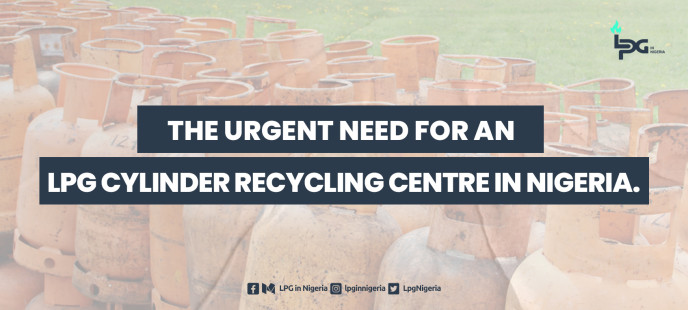- 3631
- 2
Sharing Ideas and Updates on LPG in Nigeria and related information to enable effective collaboration within the LPG Value Chain
The Urgent Need For An LPG Cylinder Recycling Centre In Nigeria

The demand for Liquefied Petroleum Gas (LPG) in Nigeria continues to rise as more households and businesses switch to cleaner, more efficient energy options. However, one critical issue that remains largely overlooked is how to handle expired LPG cylinders safely and efficiently — a growing concern for both consumers and the industry at large.
Interestingly, this blog post was prompted by a question from one of our readers who asked, "What should I do with expired cylinders, and is there a place to send them for recycling?"
A valid question, if you ask me.
As LPG usage becomes more widespread, the need for a dedicated recycling and requalification centre becomes even more pressing. Such a facility would provide a safe solution for consumers to properly dispose of, refurbish, or recertify expired and damaged cylinders, ensuring safety for both users and the environment.
Let’s dive deeper into why this is urgently needed and what the industry can do to address it.
The Problem: What Happens to Expired LPG Cylinders?
In Nigeria, LPG steel cylinders have a lifespan of 15 years, as specified by the Nigerian Industrial Standard (NIS 69:2013). After this period, these cylinders must be withdrawn from circulation to prevent leaks, explosions, and other hazards.
Unfortunately, many expired cylinders remain in circulation because there is no formal system for collecting and recycling them. Consumers are often left in the dark about what to do with expired cylinders, leading to unsafe practices such as continued use or improper disposal.
Why a Recycling and Refurbishing Centre is Necessary
A dedicated recycling and refurbishing centre would solve several critical issues in the LPG industry, including:
Safety:
Expired cylinders pose a serious safety risk. Establishing a recycling centre would ensure that damaged or expired cylinders are taken off the market and replaced with safe, recertified cylinders.
Environmental Protection:
Improper disposal of steel cylinders can lead to environmental pollution. Recycling centres can repurpose materials from expired cylinders, reducing waste and promoting sustainability.
Consumer Confidence:
Many consumers are wary of using LPG due to safety concerns. A trusted centre for cylinder requalification would boost confidence in the LPG market, ensuring that only safe cylinders are in circulation.
The Techno Oil Cylinder Manufacturing Plant: A Potential Solution?
The Techno Oil Cylinder Manufacturing Plant, located in Kajola, Ibeju Lekki, is a state-of-the-art facility with the capacity to manufacture millions of LPG cylinders annually.
While this plant is a key player in Nigeria's cylinder production, it is unclear whether they are currently involved in recycling, refurbishing, or recertifying expired cylinders.
If Techno Oil — or other major industry players — were to take the lead in setting up a cylinder recycling and refurbishing centre, it would be a major step forward for the LPG industry in Nigeria.
What a Cylinder Recycling Centre Should Do
A functional recycling centre would need to:
1. Collect expired LPG cylinders from consumers and dealers.
2. Inspect cylinders to determine if they can be refurbished or scrapped.
3. Recertify cylinders that are still in good condition after undergoing necessary safety checks.
4. Dispose of unsafe cylinders in an environmentally friendly way.
5. Educate consumers on the importance of using certified LPG cylinders.
Benefits of a Cylinder Recycling Centre
A dedicated recycling centre would bring several benefits to the LPG industry in Nigeria:
✅ Reduced Safety Risks:
Expired cylinders would be promptly removed from circulation, reducing the risk of explosions and accidents.
✅ Job Creation:
Establishing recycling centres would create jobs in cylinder collection, inspection, refurbishing, and disposal.
✅ Boost to the Local Economy:
Encouraging local manufacturing and recycling would reduce Nigeria's reliance on imported cylinders, keeping more money in the local economy.
✅ Environmental Sustainability:
Recycling centres would promote responsible waste management, ensuring that expired cylinders are properly disposed of or reused.
The Way Forward
The LPG industry in Nigeria is growing rapidly, but safety and sustainability must remain a priority. Establishing a dedicated recycling and refurbishing centre would address the problem of expired LPG cylinders, improving safety, boosting consumer confidence, and promoting environmental sustainability.
Industry players like Techno Oil and government agencies such as the Standards Organisation of Nigeria (SON) and the Department of Petroleum Resources (DPR) should collaborate to establish these centres across the country.
The time to act is now. A safe and sustainable LPG industry is essential for Nigeria’s future. Let’s ensure that expired cylinders don’t end up as ticking time bombs in our communities.
What Can You Do as a Consumer?
If you have an expired LPG cylinder, check for official guidelines from SON or your gas dealer on safe disposal. Let’s all play our part in making the Nigerian LPG industry safer and more sustainable.
Read on this in our prior blog post.
Together, we can create a safer, cleaner future for LPG users in Nigeria.
2 Comments.
-
-

Oluwabukola Jimoh
03 February 2025 - 03:30amThe easiest option will be to look for recycling options closest to you or visit gas plants like Techno oil that offers the option.
Thank you ma
Reply
-
















Adejobi Monininuola Mrs.
02 February 2025 - 09:29amGood morning, happy Sunday and new month. I just read your article on "The Urgent Need For An LPG Cylinder Recycling Centre In Nigeria". It's a very beautiful piece and educative. What then is your counsel for consumers with lots of expired gas cylinders?
Reply